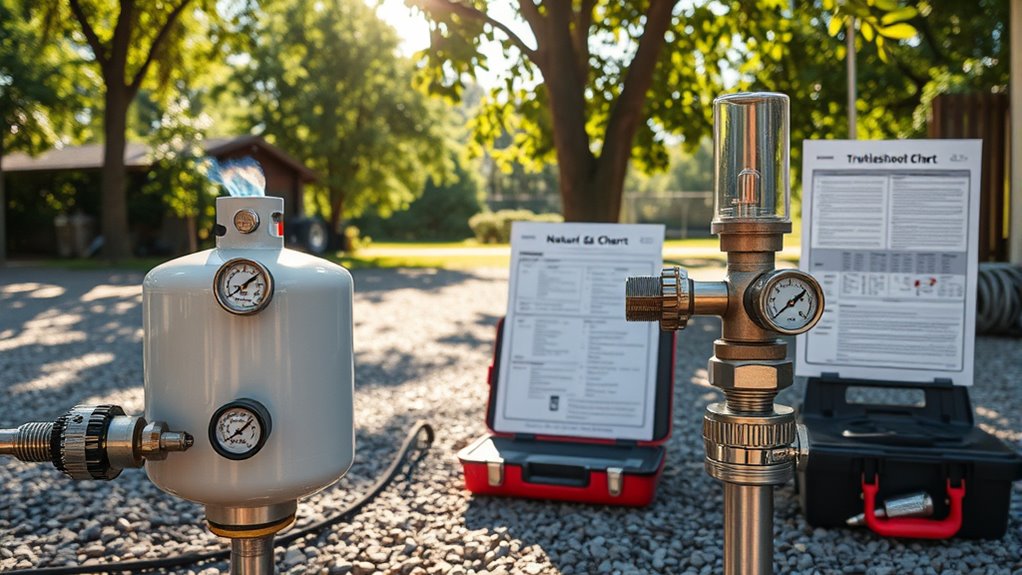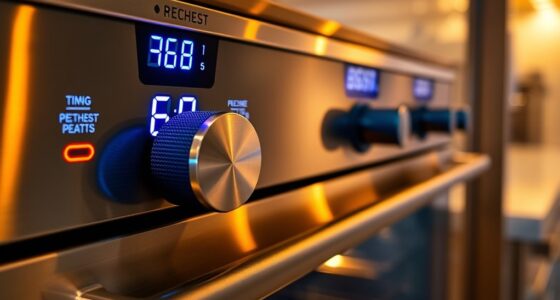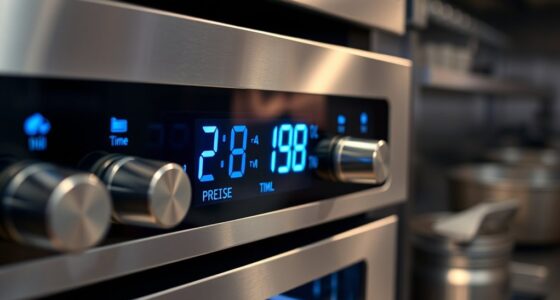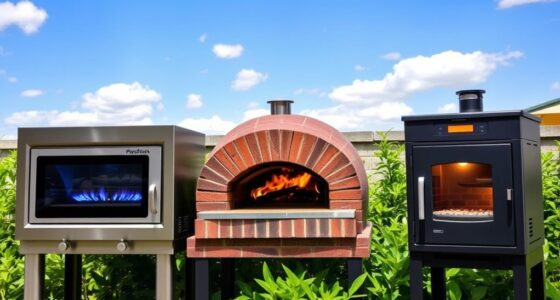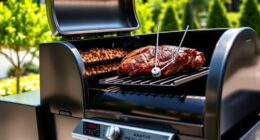When troubleshooting outdoor propane versus natural gas systems, understanding pressure and supply differences is key. Propane tanks require proper regulation, and any leaks or blockages can cause poor performance or safety issues. Natural gas setups rely on steady pressure from your supply line. Always check for vent obstructions, clean components, and confirm proper ignition. Knowing these essential distinctions and tips can prevent headaches and ensure safe operation—keep going to uncover more expert insights.
Key Takeaways
- Propane systems often require specialized regulators and pressure adjustments, unlike natural gas, which uses standard supply lines.
- Outdoor troubleshooting must account for vent blockages, debris, and weather-related obstructions affecting both gas types.
- Propane leaks are more hazardous outdoors and need immediate detection with soap solutions or gas detectors.
- Natural gas typically has a constant supply pressure, reducing some troubleshooting steps compared to propane tanks that may vary.
- Regular inspection and maintenance of regulators, supply lines, and vents are crucial for both gas types to ensure safe outdoor operation.
Understanding Gas Supply and Pressure Issues
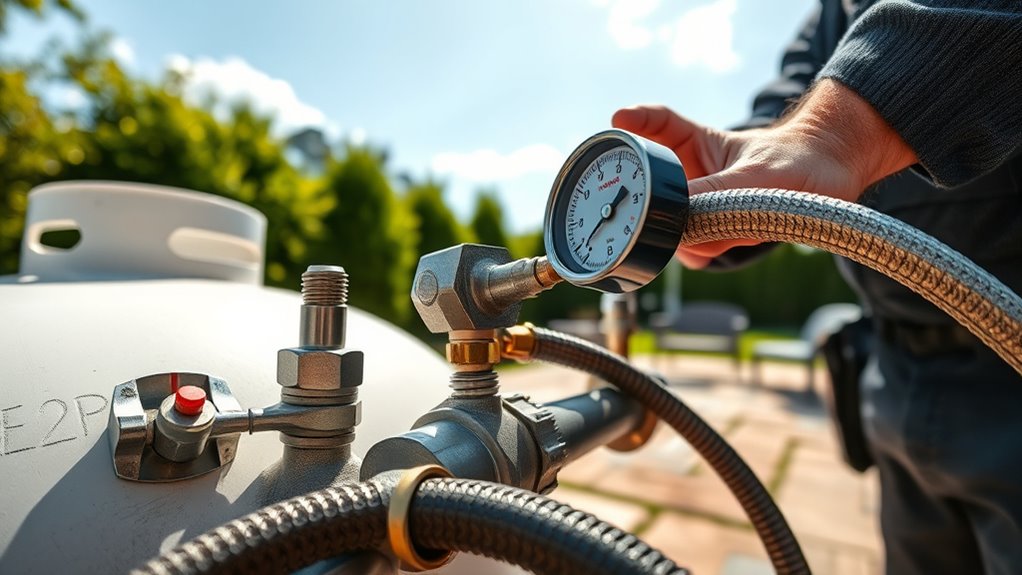
Have you ever wondered why your appliances aren’t working properly or why they keep shutting off? It might be due to issues with your gas supply or pressure. Start by examining the gas regulator, which controls the pressure coming from your supply lines. If the regulator is faulty or set incorrectly, your gas flow could be inconsistent, causing appliances to turn off unexpectedly. Also, inspect the supply lines for leaks, kinks, or blockages that could restrict flow. Proper pressure ensures safe, efficient operation of your gas appliances. Remember, inadequate pressure from supply issues or a malfunctioning regulator can make appliances underperform or shut down. Regularly checking these components helps prevent problems and keeps your system running smoothly. Additionally, understanding necessary cookies and other cookie categories can help you manage online privacy while researching solutions.
Common Blockages and Venting Problems

Blockages and venting problems can considerably impact the performance of your propane or natural gas appliances. Venting obstructions, such as debris, bird nests, or dirt buildup, can restrict proper airflow and exhaust flow. Blockages in piping, caused by rust, corrosion, or debris, can lead to inefficient combustion or dangerous gas leaks. Regularly inspect vent pipes and chimneys for obstructions, ensuring they are clear and free of debris. If you notice poor appliance performance, strange odors, or excessive condensation, these could indicate venting issues. Cleaning or replacing clogged vent pipes and addressing blockages in piping promptly can prevent safety hazards and restore peak operation. Proper venting is essential for safe, efficient functioning of your gas appliances. Proper venting is also crucial for maintaining the longevity and safety of your appliances by preventing buildup and corrosion.
Troubleshooting Ignition and Flame Problems
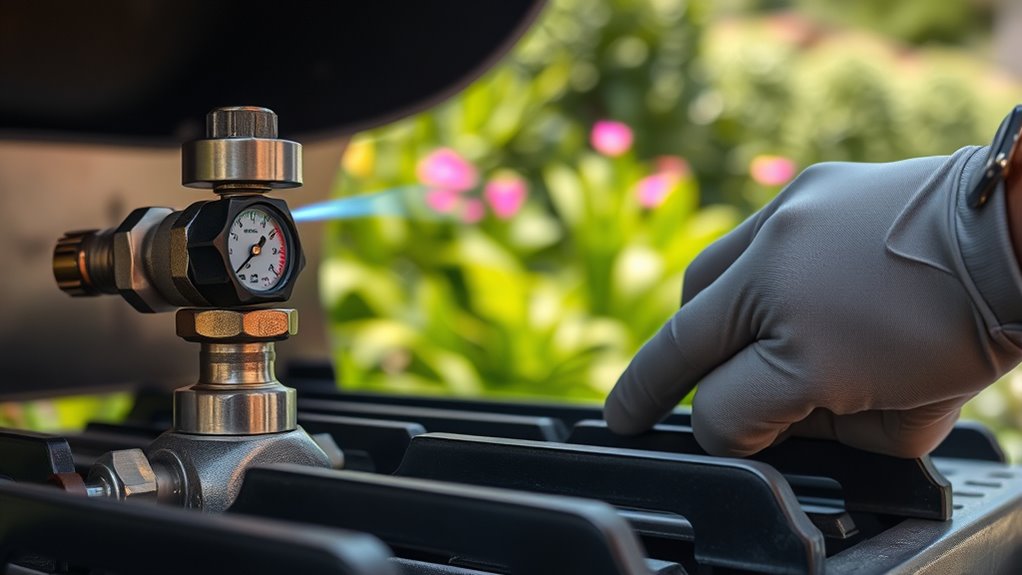
When your propane or natural gas appliance fails to ignite or the flame keeps going out, troubleshooting the issue promptly can prevent safety hazards and restore proper operation. Start by checking the ignition system: ensure the spark or pilot light is functioning correctly. If the ignition isn’t firing, clean or replace the igniter. Next, examine the gas supply: verify valves are open and gas flows freely. Finally, assess flame stability by observing the flame’s color and size—an unstable or yellow flame indicates a problem. To fix flame stability issues, clear any debris around burners and adjust the air shutter if necessary. Remember, consistent ignition and stable flames are key to safe and efficient operation. Proper troubleshooting helps prevent hazards and keeps your outdoor setup running smoothly. Being familiar with toilet maintenance and repairs can also help you quickly address minor issues before they affect your gas appliances.
Detecting Leaks and Ensuring Safety
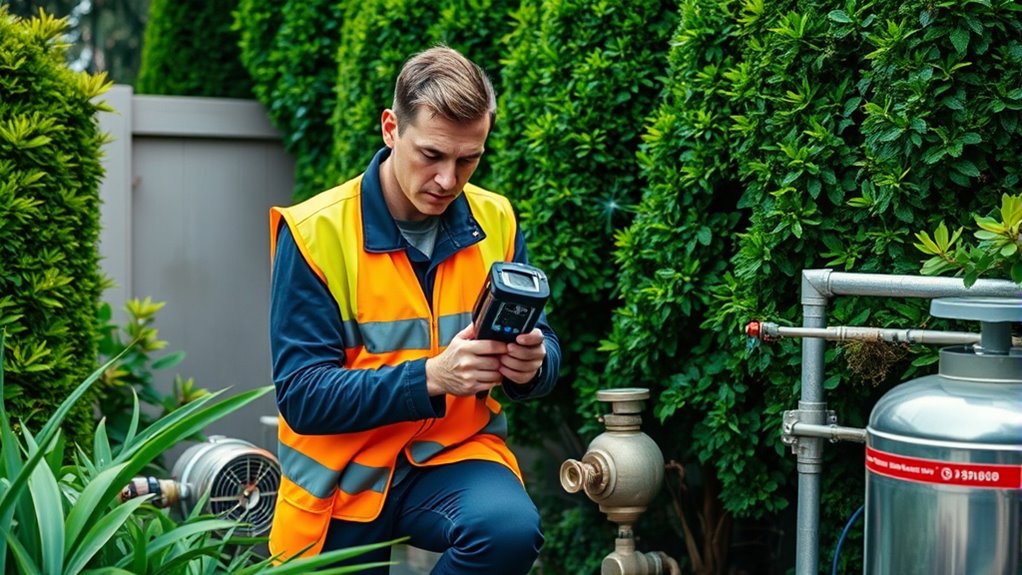
Detecting leaks is essential for maintaining safety with propane and natural gas appliances, as undetected leaks can lead to dangerous situations. Gas leak detection involves using soap solution or a gas detector to identify escaping gas. Regularly inspect connections, hoses, and valves for any signs of wear or damage. Always take safety precautions, such as turning off the gas supply immediately if you suspect a leak and avoiding open flames or sparks. Verify proper ventilation in the area to disperse any leaked gas safely. If you smell gas or notice hissing sounds, evacuate the area and contact a professional. It is also important to understand the effectiveness of eye patches and their role in skin care, which can help you recognize signs of potential irritation or allergic reactions from products used during leak inspections. Remember, early detection and cautious safety measures can prevent accidents, protect your property, and keep everyone safe around your outdoor gas appliances.
Maintenance Tips to Prevent Future Troubleshooting
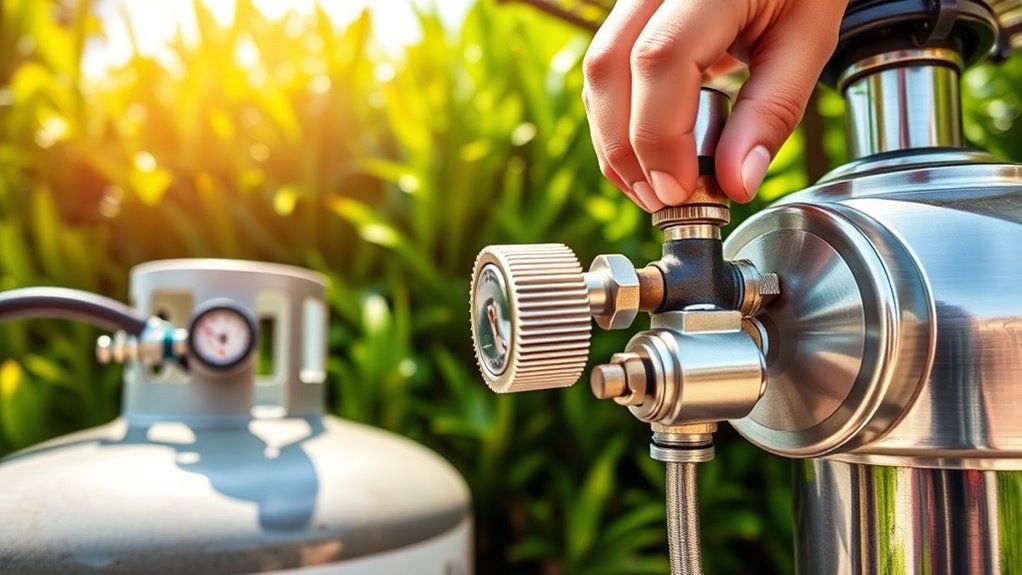
Regular maintenance is key to preventing future gas appliance troubles. To keep your system running smoothly, focus on these essential tasks:
- Tank Maintenance: Regularly inspect tanks for corrosion, leaks, or damage. Clean connections and ensure proper storage.
- Regulator Checks: Test regulators for consistent pressure and listen for hissing sounds that indicate leaks. Replace faulty regulators promptly.
- Routine Inspections: Schedule periodic professional inspections to verify all components, including hoses and valves, are functioning correctly. Ensuring proper regulator performance is crucial for safety and efficiency.
Frequently Asked Questions
How Can I Tell if My Gas Supply Is Insufficient?
You can tell if your gas supply is insufficient by checking the gas pressure and supply capacity. If your appliances are underperforming, like weak flames or inconsistent heating, it’s a sign. Use a manometer to measure gas pressure; if it’s below the recommended level, your supply might be restricted. Also, notice if multiple appliances struggle simultaneously—this indicates your supply capacity isn’t meeting demand. Addressing these issues helps ensure a steady gas flow.
What Tools Are Best for Diagnosing Venting Blockages?
Think of diagnostic tools as your detective’s toolkit for uncovering vent blockage mysteries. Use a mirror or a borescope to visually inspect vents for obstructions, and a manometer to measure pressure drops that signal vent issues. A smoke pencil can help reveal leaks or airflow problems. These tools give you a clear picture of venting problems, helping you pinpoint blockages quickly and keep your system running smoothly.
How Do I Reset a Tripped Gas Safety Valve?
To reset a tripped gas safety valve, first make certain you’re following safety regulations and have turned off all appliances. Locate the valve, usually near the gas meter or appliance, and press the reset button or lever. If the valve trips again, it’s essential to review emergency procedures and consult a professional. Never force the reset, and always prioritize safety to prevent potential hazards.
Are There Specific Signs Indicating a Gas Leak?
A gas leak is like a silent alarm waiting to go off. You should watch for gas leak indicators like hissing sounds or bubbling around connections. Odor detection is your best warning—if you smell rotten eggs or sulfur, evacuate immediately. Don’t ignore these signs; they signal a potential danger. Always turn off the gas supply and call a professional to inspect and fix the leak safely.
How Often Should Outdoor Gas Appliances Be Professionally Inspected?
You should have outdoor gas appliances professionally inspected at least once a year to guarantee proper gas pressure and safety. Regular checkups help identify issues early, which can extend the appliance lifespan and prevent leaks. If you notice any irregularities in operation or smell gas, get a professional inspection immediately. Proper maintenance keeps your outdoor setup safe, efficient, and running smoothly, giving you peace of mind year-round.
Conclusion
Now that you know the common issues and troubleshooting tips, you’re better equipped to handle outdoor propane and natural gas problems. Regular maintenance and quick detection can save you time, money, and safety risks. Imagine your outdoor space—fire pits, grills, heaters—always ready to use without surprises. Isn’t it worth taking a little time now to make certain everything runs smoothly later? With these tips, you’ll enjoy worry-free outdoor moments, no matter the gas type.
